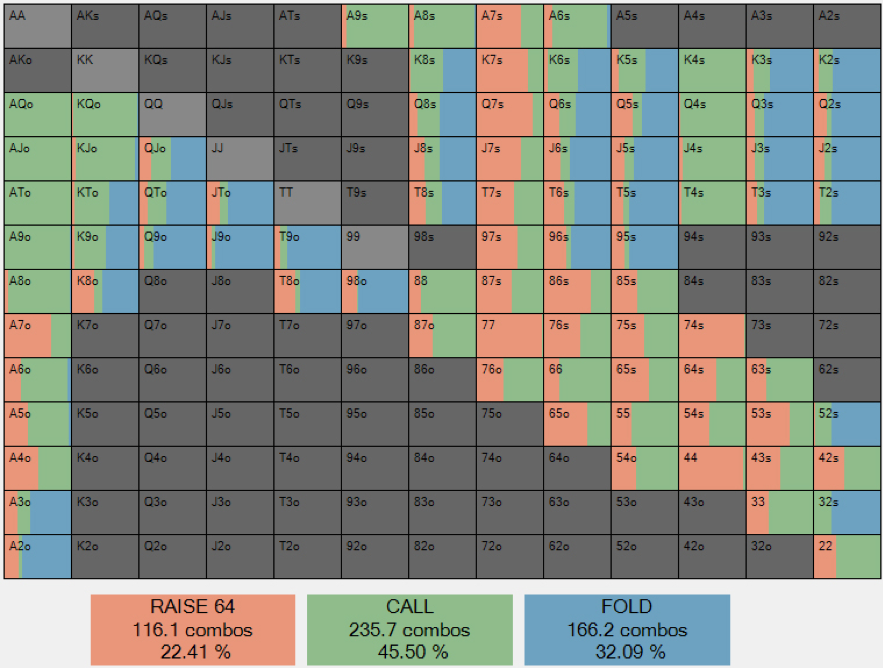Check Raise
To stay in the pot without making an additional bet and then increase the size of the wager on one's next action; to check on one's first action in the round with the expectation that another player will bet or raise, and then to raise or re-raise that opponent's wager.
- When a player first checks and then raises in a betting round. Check-raising can be a means for a player with a strong hand to trap an opponent in order to try to extract more chips.
- A check-raise is when one player checks his hand on the flop, another bets and then the original player comes back over the top with a raise. It’s a very effective play – both as a bluff and with a big hand – but remarkably, check-raising was banned in some Las Vegas casinos for being an.
- A check-raise is made when you check when the action gets to you, with the intention of raising if your opponent bets, hence the name 'check-raise'. As you can imagine it is an interesting move because at first you show weakness to your opponent by checking, and then coming over the top of them to show a great amount of strength.
- The flop check raise is a powerful move in no limit hold em. It is designed to take the initiative away from the initial raiser and symbolises to them that you have a stronger hand than theirs. A general fundamental weakness in microstakes players is being too passive and instead of betting and raising, they are checking, calling and folding.
A check-raise in poker is when you check on a betting round (usually in earlier position) in the hope that someone else will then be able to raise their bet when the action comes back to you.
When and How to Check-raise

In a No Foldem Holdem game you will be playing starting hands that are on average stronger than your opponents (especially in earlier positions your hands will be very strong) and therefore on many flops you will probably have the best hand.
Further, your hands against many opponents, will often be vulnerable (e.g. 'top pair top kicker' hands). In these situations it is often a good technique to go for a check-raise to increase the amount of money in the pot while you have the best hand and also to charge the people on draws (especially weak draws) more money.

For example, let's say you started with pocket kings
| You Hold: | And The Flop Is: | ||
|
|
There's a very good chance your pocket kings are best right now, but there are still many people in the hand and a large percentage of them will have (in their minds at least) drawing hands, or perhaps top pair with a four kicker. Your goal on the flop and possibly on the turn is to make them pay for their draws and ideally drop them to increase you chances of winning the pot.
Ideally someone in late position will be the initial bettor and you can then raise immediately when the action returns to you. This will cause everyone after you to call at least two small bets (and possibly more as people after them may re-raise). This means many weak draws (typically gutshots and worse) will be charged a price that they don't have pot odds to pay, so no matter what they do it benefits you--either by them putting money in the pot when they don't have odds to play or by folding and increase your chances to win the pot at the end.

You should still always attempt a check raise if you feel it is very likely you have the best hand on the flop if you are relatively sure someone else will bet when you check. Some tables are so passive that any time you check there is a signficant chance the whole table will check behind you. If you are sitting at that kind of a super-passive table you must bet all your strong made hands and draws on the flop and will generally not be able check-raise.
Why Check Raise?
Check-raising with strong but vulnerable hands
Well you might say to yourself (with good reason) that since it is likely that top pair with an ace kicker is good right now it could easily be beaten on the river, so why don't I just wait and see... The reason is that with a large number of people in the pot there are reasonable pot odds to make all sorts of wild draws against you UNLESS you check raise. This is especially true if you are in very early position and someone in late position makes the first bet since you can force several people to call double bets.
Everyone who calls two bets after you with a gutshot straight draw (or worse) is making a mathematical mistake and while they may or may not pay for it this hand they will pay for it in the long run.
Check Raise Wow
Another note about check raising... Usually you want to make this move when you have a very strong but vulnerable made hand on the flop or turn, but you DO NOT want to check raise with draws or with made hands that are not very vulnerable (like straights, flushes and sets depending on the consistency of the board). For those sorts of hands you do not want to force people out of the pot as you'll gain the most money by having the largest number of customers. Examples of strong but vulnerable hands are: overpairs, top pair high kicker, two pair or a sometimes a set (if there are straight and flush draws on board) on the flop.
Check-raising with draws
Usually you will not want to check raise with your strong draws (flush, open ended straight or better) since you will make the most money with these sorts of hands with the maximum number of callers. The exception to this is when you have reason to believe that the person immediately to your left will be the initial bettor (in which case no players will have to call both bets cold when you checkraise and you can maximize the amount of money in the pot on this betting round). If you do make this checkraise with a draw on the flop and then miss your draw on the turn it is perfectly ok to check again on the turn. This will help to disguise your hand and will sometimes give you a free card if the table is passive and checks the round behind you.
If someone does bet then you can make a decision when the action returns to you whether to call or raise based on your percentage chance of making your draw with one card to come.. This gives you the equivalent of a positional advantage even though your absolute position on the table is bad (early position).
Against a lot of opponents you'll always have odds to draw to your strong draws but sometimes you have odds to raise with them even on the turn. So if you have 15 outs to the nuts (or to hands that you think will probably win) and there are four callers on the turn then go ahead and checkraise them if the person to your left is the one that started the betting. It is a very rare thing when you can checkraise more than once during a hand so take full advantage of it.
The Holy Grail: Three Check-raises in a hand
Finally, if you make your draw, you can decide to go for the holy grail and attempt a third checkraise. Mike Matusow has said that he's only been able to checkraise an opponent on all three rounds three times in his entire life, but I am guessing he doesn't play a lot of low limit Texas Holdem poker! Since you will always be checking the river if you miss your draw and your opponents may very well be making their weaker draws on the river it is sometimes very possible to go for this elusive play.
Check Raise Gift Card Balance
If you do manage it post a hand history on the Low Limit Poker forum!